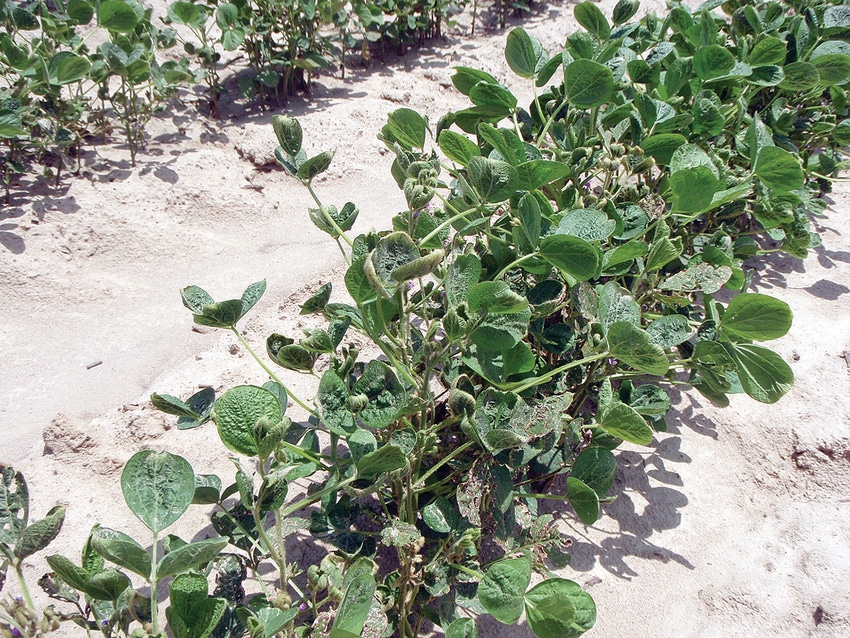
In late June, dicamba drift symptoms are showing up all across east Arkansas with more reports coming out of the Missouri Bootheel. So, what’s happening on the east side of the Mississippi River?
In Mississippi, Extension weed specialist Jason Bond is covered up with drift calls and field visits. “In this part of the Mid-South, it’s just more of the same. I’m talking to guys who say it’s on all the beans they’re checking.
“Honestly, I don’t know how many growers I’ve heard from and how many fields I’ve looked at. I quit keeping track — it’s just an endless stream. As of (June 27), we had 32 official complaints and more had come in. I’m having trouble wrapping my mind around the scale of what’s happening.”
What advice is Bond offering?
“We’re beyond replanting. We have some small soybeans in places but, as a rule, our soybeans are well into reproductive growth and are very vulnerable. I can’t say it’s perfect advice — who knows what the outcome will be? — but if my beans were drifted on and there’s a good chance of yield reduction, I’d want to protect everything else. It may not be easy to do, but I’d stick with the plan. So, if it’s time to irrigate, I’d go ahead and turn on the pump.”
In Tennessee, Larry Steckel is working a similar storyline. “Last year, in August, we had 47 total complaints,” said the University of Tennessee weed specialist late Wednesday (June 28). “I thought that was pretty bad. I believe we passed that total today — if we didn’t, we tied it. So, basically in two weeks we have as many complaints in 2017 as we had in all of 2016.
“Last year, we had around 10 counties with dicamba drift complaints. This year, complaints have come in from almost all the counties in west Tennessee.”
The number of calls Steckel is fielding “is phenomenal. It’s so widespread it’s kind of overwhelming. In some areas if a crop isn’t dicamba-tolerant it’s showing symptoms. I’m not happy to report it, but that’s just the way it is.
“Really, what’s happening here is the mirror image of what’s happening across the river. We’re in this together.”
West Tennessee is “definitely” getting hit worst. “Of course, 75 percent of the row crops are in that third of the state. Middle Tennessee has hardly any complaints. It’s just a different topography and different weather – the river counties are a different world in the Mid-South.
“There have been a few calls about commercial vegetables – tomatoes, cow peas, gardens. I was looking at some trees yesterday. It’s beyond soybeans, although that’s the primary driver of the calls, 90 percent.”
Has there been any chatter about following the Arkansas Plant Board’s dicamba ban?
“There’s definitely noise about following Arkansas’ ban,” said Steckel. “I’ve had growers tell me direct they want something similar. On the other hand, others don’t want a ban. So, as I said, just like Arkansas, this has divided agriculture here. What the Tennessee Department of Agriculture will do, I don’t know. We’ve had a couple of meetings with them and they’re weighing the facts, mulling over options.”
About a move to ban the products, Bond said “If there are conversations going on, I’d like to know they’re happening. But I’m not involved in the regulatory part of this and that’s fine.”
The off-target issues are throughout the state, said Bond. “Earlier, it looked like it wasn’t as big a problem in the north Mississippi Delta. Well, strike that.
“I was going to look at a field yesterday, just driving down the highway, and you can see damage on both sides of the road. (A colleague) called me while he was heading to a rice field and he drove one four-mile stretch with damage on both sides. It’s hard to explain the scope of this.”
Steckel agrees. “I knew we’d see drift and there’d be problems. But I had no idea it would be to this scale. The scale caught us all off-guard, I think.
“Every day, I talk to my counterparts across the river. That’s important and we’re trying to keep everything in perspective.
“You can’t help but wonder if this is heading up to the Midwest. They’re a couple weeks behind us on spraying and it’ll be interesting to see if the problems keep heading north.”
About the Author(s)
You May Also Like




